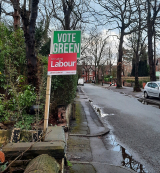
Migrants and refugees arriving on the island since 2018, coupled with the emergence of far-right movements, have created a simmering crisis in Cyprus due to the absence of a comprehensive
integration policy.
In the coastal city of Limassol, life and commerce have gradually returned to the multi-ethnic shops along the waterfront, which were targeted by anti-migrant attacks in early September. A Vietnamese grocery store, previously ransacked, has reopened its doors. Egyptian restaurants, still bearing the scars of shattered windows, are once again grilling meats. A Syrian café sees a handful of men gathering for hookah sessions, while Arab and Asian patrons visit for haircuts from two Syrian barbers during the evening hours. Nearby, Nepalese and Indian migrants convene for dinner at a small cafe.
Nevertheless, a sense of unease lingers. "It's not like it used to be," confided an anonymous Nepalese woman. "I used to adore Cyprus: every community had its own unique traditions, and we all felt secure. Today, I live in fear of further attacks." This young widow supports her daughter, who remains in Nepal under the care of relatives. Photo by dronepicr, Wikimedia commons.








































